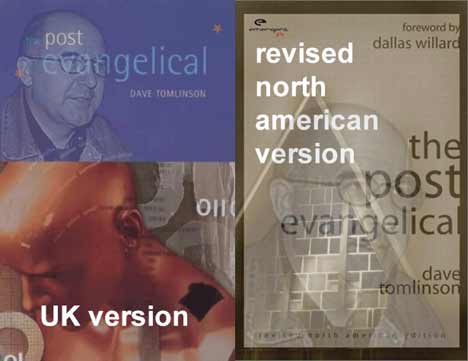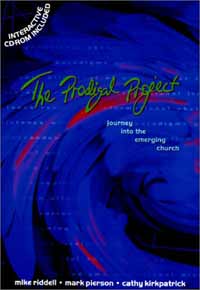Gordon Lynch’s third chapter of “After Religion” looks at ‘Generation X’ and evangelical Christianity – with particular reference to the British scene. Dave Tomlinson’s book, “The Post-Evangelical” is described as a key text for individuals who are struggling to reconcile their Evangelical background and ‘Generation X’ sympathies.

The Post Evangelical
Tomlinson published “The Post Evangelical” in 1995. The book was republished in the USA in 2003 by Zondervan and Youth Specialties as part of the ’emergent series’. He was for many years leader of Holy Joes, a community of Christians who met regularly in a London pub. He’s now an Anglican vicar at St Luke’s Holloway.
I relate well to Dave Tomlinson’s approach. Growing up in Evangelical circles in New Zealand, I and many of my friends were faced with a choice of being a ‘real Christian’ (read conservative Evangelical who believes the right things and lives the correct lifestyle) and a ‘liberal’ or ‘backslider’ or lapsed Christian (read someone who dared to think differently, read or listen to people other than accepted writers and speakers, choose different approaches to alcohol, sexuality and movies).
Tomlinson outlines the call to move beyond flat pack furniture – furniture that can only be assembled in one way. He gives the metaphor of meccano sets – sets that can be assembled in a range of formats. Religious truth for the ‘post evangelical’ emerges out of interaction between the Christian tradition and the personal perceptions, thoughts and values of the individual believer.
I’m not too sure the meccano metaphor works for me. Meccano was always something my older brother worked with. I was brought up on plastic rather than metal.
The Prodigal Project
 Gordon Lynch also refers to the Alternative Worship scene that’s grown up in the UK – another expression of ‘generation x’ approaches to faith. Lynch explains that Generation X values are found in the open-ended, creative and personally authentic search for meaning found in alternative worship services. It’s interesting to note that a key text used by Lynch is “The Prodigal Project“, written by Mark Pierson and Mike Riddell of New Zealand, and Kathy Kirkpatrick of Australia.
Gordon Lynch also refers to the Alternative Worship scene that’s grown up in the UK – another expression of ‘generation x’ approaches to faith. Lynch explains that Generation X values are found in the open-ended, creative and personally authentic search for meaning found in alternative worship services. It’s interesting to note that a key text used by Lynch is “The Prodigal Project“, written by Mark Pierson and Mike Riddell of New Zealand, and Kathy Kirkpatrick of Australia.
What I found particularly interesting about this chapter of “After Religion” was Lynch’s observation that while alternative worship and post evangelical approaches to theology may resonate with an emerging ‘generation x’ search for personal meaning, mainstream evangelicalism is growing at a faster rate. In fact, Lynch lists factors that impede the growth of these movements: limited interest in converting others to their point of view, a lack of active ‘mission strategy’ and a rejection of the ‘more traditonal Evangelical preoccupation with numerical church growth’. It appears as though being fringe, on the margins, underground is preferred to being widely accepted. I guess that figures. Otherwise it wouldn’t be ‘alternative’ or ‘post’, would it?
My own reflection on these movements, having identified myself with them here in Australia and New Zealand, is that they are helpful reminders of the need to break out of the box. The phrase “This, and more” summarises for me the sense of being grounded in many of the beliefs and assumptions held by evangelical Christians and traditional worshippers. While being grounded in a common life in Christ, the actual cultural expression of faith may be broader or be formed in ways not expected in traditional circles.
The same goes for postmodernism. Seeking personal meaning does not need to preclude sharing in common beliefs. Paying attention to personal experience and emotion does not need to exclude the valuing of reason and logic. It’s not one or the other. ‘Post’ does not need to mean ‘Ex’. For me it’s like knocking some of the walls out and adding new rooms to make room for a growing family.
Like many Christian movements, these two waves of Christian faith provide a language and network that gives permission to leave the confines of a movement without leaving Christ. And so Lynch’s title, “After Religion”. Lynch goes on to explore this process in his latest book, “Losing My Religion“.
